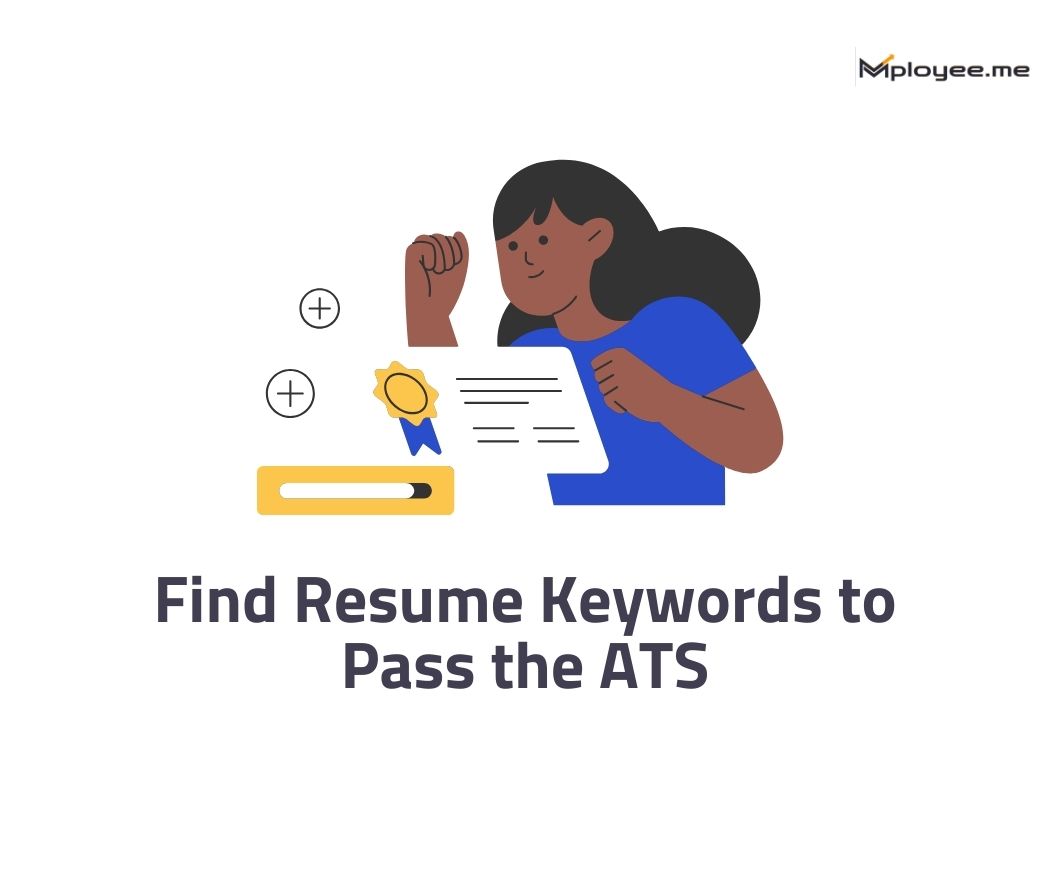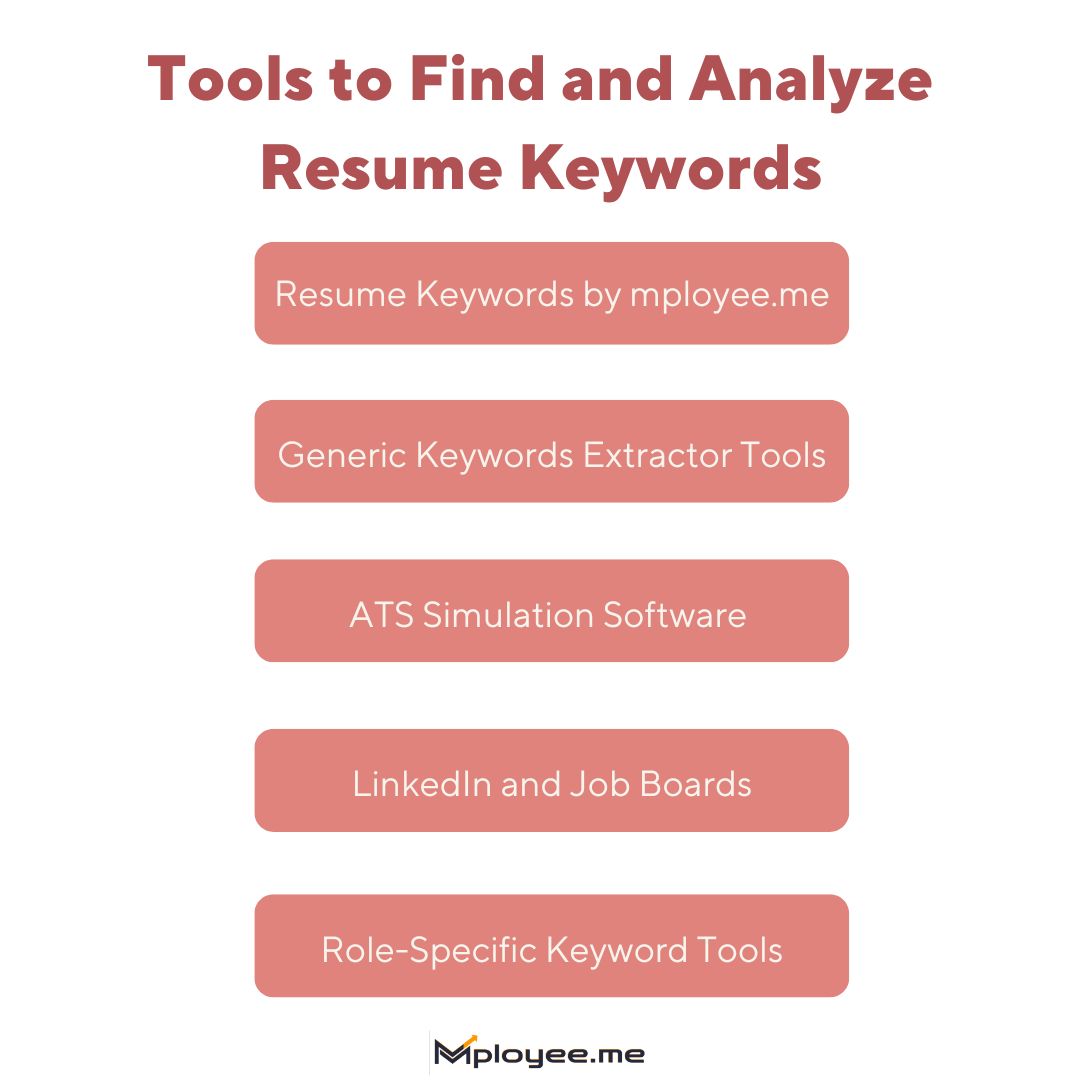
We'll cover
Find Resume Keywords to Pass the ATS
Written By Editorial Team

We'll cover:
How Resume Keywords Affect Your Shortlisting Chances
Recruiters can get thousands of responses to a single posting. ATS systems completely automate the review process. All these systems do is check to see if the resume has the right words for the position.
- Automated parsing: With ATS software, details from different sections like skills, work history, and qualifications are automatically checked for relevant terms.
- Keywords resume scanning: Once a job description is fed into the system, the ATS starts looking through every application, comparing every line against desired keyword.
- Scoring and ranking: Candidates are ranked according to their resume. So, if the job wants “Agile methodology,” “roadmap planning,” and “stakeholder communication,” ATS will want all that and expects them in your resume.
- Context matters: Placement of keywords matter in the resume. Resume keywords like ‘cross-functional leadership’ have greater impact when highlighted in specific job achievements rather than being buried in a generic skills section.
- Filtering results: Recruiters tend to only focus on the top-scoring resumes. Many strong candidates may never be reviewed.
Because employers want to filter resume databases quickly and effectively, they rely on ATS to only send them qualified applicants.
Tools to Find and Analyze Resume Keywords
The use of tools isn’t just faster but it makes the identification of keywords much more accurate and evidence-based compared to the manual identification of keywords structure which is very tedious and time-consuming.
- Resume Keywords by mployee.me: The ‘Resume Keywords’ tool by mployee.me allows users to upload their resume and the job description for the desired role. This tool identifies missing keywords and suggest keywords to be used. This way, you can pass ATS. Think of it as a real-time keyword generator for resume.
- Generic keyword extractor tools: Some simple online tools scrape commonly used terms from multiple job postings. While basic, they provide a useful starting point for optimizing your resume with the right keywords.
- ATS simulation software: There are certain software tools that function as employer ATS to simulate the employer’s ATS software. These tools users can run their resumes through in addition to keyword optimization so that they can know their resume’s ranking in a pool. That way, users can know in advance if their resume needs more polishing before submission.
- LinkedIn and job boards: Looking through job descriptions in your field helps you find the right resume keywords. If several jobs require “customer journey mapping,” it’s a good indicator that you need to mention it.
- Role-specific keyword tools: Niche jobs have their own tools. For example, product management resume keywords tend to have a set of leadership, execution, and strategy terms that are quite different from either marketing or finance roles.
The regular use of these tools guarantees that you get a resume tailored for every single application you have to send.

Common Mistakes to Avoid When Using Keywords
For many job seekers, the use of resume keywords presents a challenge with the possible risks of overuse, misuse, or a lack of attentiveness to the surroundings. The following is a step-by-step guide of the do's and don’ts.
Resume Keyword Mistakes and Fixes
Keyword Stuffing
🚫 Don’t: Repeat the same keyword everywhere.
✅ Do: Use keywords naturally and only where relevant.
Ignoring Context
🚫 Don’t: Place keywords in wrong sections.
✅ Do: Match keywords with real skills and results.
Copy-Pasting
🚫 Don’t: Copy job descriptions word-for-word.
✅ Do: Pick key terms and blend with your experience.
Skipping Soft Skills
🚫 Don’t: List only technical terms.
✅ Do: Add soft skills like teamwork and leadership.
Outdated Terms
🚫 Don’t: Use old titles like “Webmaster.”
✅ Do: Update with modern titles and tools.
Not Customizing
🚫 Don’t: Use one resume for all jobs.
✅ Do: Adjust keywords for each job posting.
Keep it simple: right keywords, right place, right balance.
Tips to Stay Updated with Trending Keywords in Your Field
All industries change rapidly, and the demand for new hires changes with it. Keeping up with resume keywords helps keep your resume.
- Search for job offers every week and note down frequent words. As an example, many job offers now focus on "customer-centric design" to be used as a resume keyword.
- Look after LinkedIn influencers. Look from the industry as well as industry blogs, as they are likely to use new words that become necessary later.
- Use a resume keywords generator every month. Ensuring your resume is up to date means it contains the latest resume keyword phrases.
- Make use of resume keyword generator tools. They update to new employer needs automatically.
- Attend networking events. Recruiters' preferred resume keyword phrases for interviews are often shared by colleagues.
Updating regularly indicates to employers you are aware of changes in the industry and new trends.
Matching Skills to Keywords in Different Fields
Each field demands a specific set of resume keywords. The following is a brief on how to match and showcase your expertise.
- Technology: Specify the frameworks and programming languages you know. Some of the resume keywords to include are “Agile,” “Scrum,” and “Python.”
- Marketing: Strike a balance between imagination and data. Sample resume keywords include “SEO optimization,” “campaign management,” and “brand strategy.”
- Product Management: Focus on leadership and delivery. Important product management resume keywords are “roadmap planning,” “cross-functional leadership,” and “market analysis.”
- Finance: Emphasize on compliance and analysis. Good resume keywords examples include “risk management,” and “financial modeling.”
- Healthcare: Emphasize on certifications and patient care. Examples include “clinical protocols,” and “patient safety.”
Tailoring industry-specific keywords ensures ATS sees you as the right fit for the role.
How To Add Keywords in Resume
To resume, here are the steps in simple and easy to follow manner which allow one to insert keywords into his or her resume:
Step 1: Job Description Analysis
Draw attention to the main words such as job titles, skills, tools and licenses that are specifically mentioned.
Step 2: Keyword List
Sort the keywords you have gathered in five categories, which are titles, hard skills, soft skills, tools and credentials. You can also use a resume keywords generator.
Step 3: Exact Wording
Through the usage of the exact words from the job ad (for instance, “Adobe Creative Suite” vs “Adobe Creative Cloud”) make your resume compatible with the ATS matching logic.
Step 4: Keywords Placement
Put them in the summary, skills section, work-experience bullets and certifications. Do not just list them, but rather engage them.
Step 5: Action Verbs
Merge the keywords with verbs like “led”, “managed”, “optimized” to portray the real accomplishment.
Step 6: Customize for Every Job
Customize your resume for every application so that the keywords are appropriate for that particular role and company.
Step 7: Don't Overstuff with Keywords
Repetitive keywords or hidden text can be a reason for your resume to get rejected by either ATS filters or human reviewers; hence avoid inserting them in excess.
If one follows these steps, he or she will have a talking resume which can communicate in both the system’s and the recruiter’s language and thus, get noticed with a better chance.
Key Takeaways
Understanding the significance of resume keywords for employers is a crucial aspect of today’s digital hiring process. The recruiters have to rely on Applicant Tracking Systems (ATS) for filtering the applications in an efficient manner, thus making keyword optimization the ultimate factor for deciding the visibility of your resume to a human.
- ATS systems automatically scan and rank the resumes based on keyword relevance and the context in which they appear.
- The location of the keywords is significant. The sections containing achievements and those pertaining to a specific job are given priority over the generic lists.
- With Resume Keywords by mployee.me, the job seekers get the help in discovering and inserting the absent keywords.
- Don’t commit the common mistakes like keyword stuffing, irrelevant placement, and using outdated terms.
- In addition to technical terms, soft skills keywords such as “leadership” and “team collaboration” should also be included.
- Before each application, use a keyword generator to customize every resume, thus increasing the ATS scores.
- Keep up with the keyword trends by regularly checking them out on LinkedIn, job postings, and resume tools.
- The first step to creating a long-term keyword strategy is by having a “keyword bank” which you will update every month.
If the job seekers use resume keyword tools efficiently, they will not only remain competitive but also their applications will be the ones that go through the automated filters straight to the real recruiters.
What are the keywords employers look for on resumes?
Recruiters and Applicant Tracking Systems (ATS) scan resumes for keywords that directly match the job advertisement be it skills, software, certifications, or accomplishments. If a product management position lists certain keywords, such as “roadmap execution,” “market analysis,” or “Agile methodology,” your resume should contain them. A resume keywords generator uncovers and appropriately integrates such terms.
How do you say your skills match the job description?
What is the best way to use keywords in your resume?
How to match job description with resume?
What are keywords skills for resume?

Got Your Answer ?
Learn this in 30 Seconds 👇
Career Blogs
Our career blog is your go-to resource for insightful advice, practical tips, and the latest trends in the job market.

Office Address: Room No 305, IIT ROPAR-TBIF, Top Floor (East Wing), M.Visvesvaraya, Rupnagar PB, 140001
- Free Online Resume Review
- Check Resume Score
- Job Description Keyword Finder
- Resume Shortlisting Software
- Resume Scanner for Jobs
- Find jobs that match with resume
- Job matching platform
- Resume job matching
- Job suggestion
- Best sites to find jobs
- Free ats resume scanner
- Auto apply for job
- Full Time Jobs
- I Need a Job
- Information Technology Jobs
Can't Find Something? Get in Touch.
©2026 Padhakku Peek A Book Pvt Ltd (Mployee.me)






